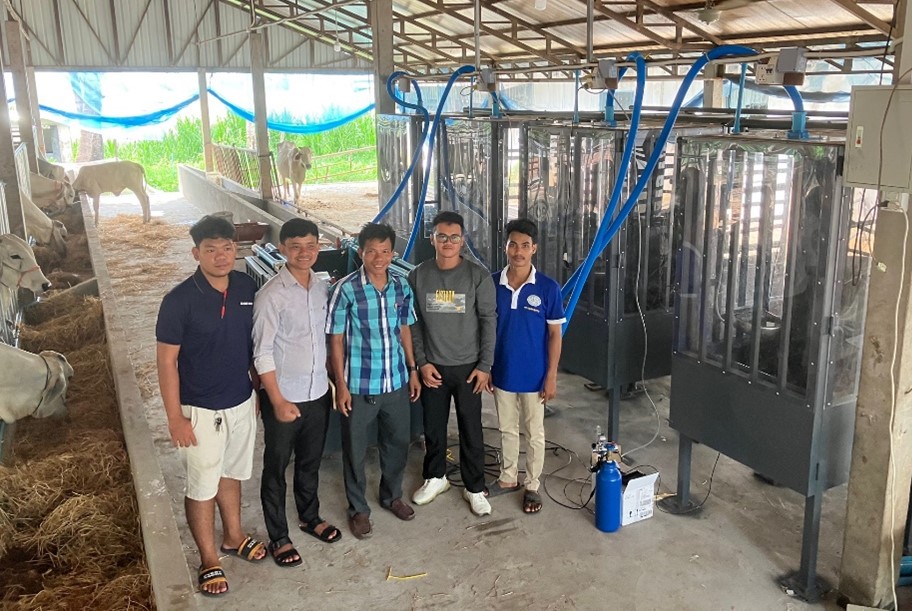Closing Date: 18 August 2024
Location: Sveriges lantbruksuniversitet, Swedish University of Agricultural Sciences, Uppsala
We are looking for a postdoc to work with us on projects that relate to soil carbon cycling in agricultural systems as affected by various management practices, especially the contribution of cover crops. The work also involves the effect of soil carbon on crop productivity and resilience (yield stability) to climate change. The duties include analysis of empirical data from long-term field experiments and national soil inventories as well as application of soil carbon models.
For more information on the postdoctoral position please click the links below.
Closing Date: 15 July 2024
CCAC is hiring a new consultant to develop a report on leveraging digital agricultural extension services to scale productivity improvements for methane abatement in the livestock sector. This is a five-month contract to develop the report to be presented at COP29.
For more information click HERE.
Watch the recording of the Croplands Research Group webinar.
Food and Agriculture Organization of the United Nations has released Issue 23 of the FAO LEAP Newsletter.
This is now available to view HERE.
We are excited to share the video of the Introductory Webinar for the Qinisa Project held on June 19, 2024. The Qinisa Project is a ground-breaking regional initiative aimed at improving the collaboration and coordination of agricultural greenhouse gas (GHG) research across Southern Africa. By networking research activities and aligning national and regional programs, the project seeks to foster low-emission, climate-resilient agricultural food systems.
Watch the Introductory Webinar to learn more about the Qinisa Project, explore opportunities for enhancing research collaboration, and discover ways you can get involved.
The Nitrogen Flagship (N flagship) was implemented by the Global Research Alliance on Agricultural Greenhouse Gases (GRA) for the period 2022-2027. The aim of this flagship is to help countries to improve their national inventories reporting under the Paris Agreement, by developing Tier 2 (reflecting local soil and climate conditions) and Tier 3 (modelling based) emission factors for the use of N fertiliser, relevant for the estimation and reporting of direct N2O emissions from soils.
Read the newsletter below.
Three brand-new livestock methane measurement facilities have been established in Laos, Cambodia and the Philippines as part of New Zealand’s Climate Smart Agriculture Initiative in ASEAN (2020-2026). These facilities are the first in each of the countries to permit measurement of animal emissions over prolonged periods. They feature breath capture cabinets which can measure an animal’s methane emissions, feed intake and feed digestibility. This technology allows local researchers to answer important questions such as which local feeds produce the least methane when eaten.

Read more in the Newsflash below.
Traditional vs. Advanced Approaches: Explore the evolution of rumen microbe culture techniques, from traditional methods to cutting-edge advancements. Learn about recent breakthroughs in the field.
Overcoming Cultivation Challenges: Address the obstacles hindering rumen microbe cultivation and identify the resources available to overcome them.
Session 1:
Session 2:
Closing Date: 17 June 2024
Location: Ireland
The School of Biological Sciences and Institute for Global Food Security at Queen’s University Belfast is currently seeking to appoint an exceptional candidate to the post of Research Fellow. The appointee will join the Huws group, focused on sustainable livestock production using the disciplines of Microbiology, Animal Science, and Bioinformatics.
For more information click HERE.
Funding has been made available to enable researchers from New Zealand to take part. The 2024 Green ERA-Hub Call is developed by the partners of the ERA-Hub Call in collaboration with the Global Research Alliance on Agricultural Greenhouse Gases (GRA) and the Wheat initiative. The overall objective of this 2024 joint international funding Call is to advance the climate smart farming for climate change adaptation, resilience to stresses, and crop and livestock health, in a context of the economic sustainability of farming.
24 May 2024 (GMT +13)
The GRA Agricultural Inventory Training Programme (GRAIT) streamlines current agricultural inventory capacity building initiatives under the Enhanced Transparency Framework (ETF) of the Paris Agreement.
It achieves this through leveraging the GRA’s collaborative ethos across its network of member countries, partner organisations, scientists and policy personnel. It is a coordination initiative that aims to accelerate the development of robust agricultural inventory systems in developing countries by:
• Providing readily accessible information on past, present and future agricultural GHG inventory capability building programmes so that new training programmes are built on existing work,
• Encouraging greater funder-funder collaboration when developing and delivering new training initiatives, and
• Providing a platform to identify and promote new funding and training opportunities.
We welcome you to join us in person or online for the launch of GRAIT on 24 May. Please see the attached agenda which also includes the link to join in online HERE.
WEBINAR: FOOD SAFETY IMPLICATIONS FROM THE USE OF ENVIRONMENTAL INHIBITORS IN AGRIFOOD SYSTEMS
Experts discuss the food safety implications of environmental inhibitors in agrifood systems
The webinar Food safety implications from the use of environmental inhibitors in agrifood systems, hosted by FAO, took place on 10 May 2024. The event aimed to stimulate discussion on the food safety aspects that need to be considered and addressed when using environmental inhibitors in agrifood systems.
Find out more and watch the recording HERE.
